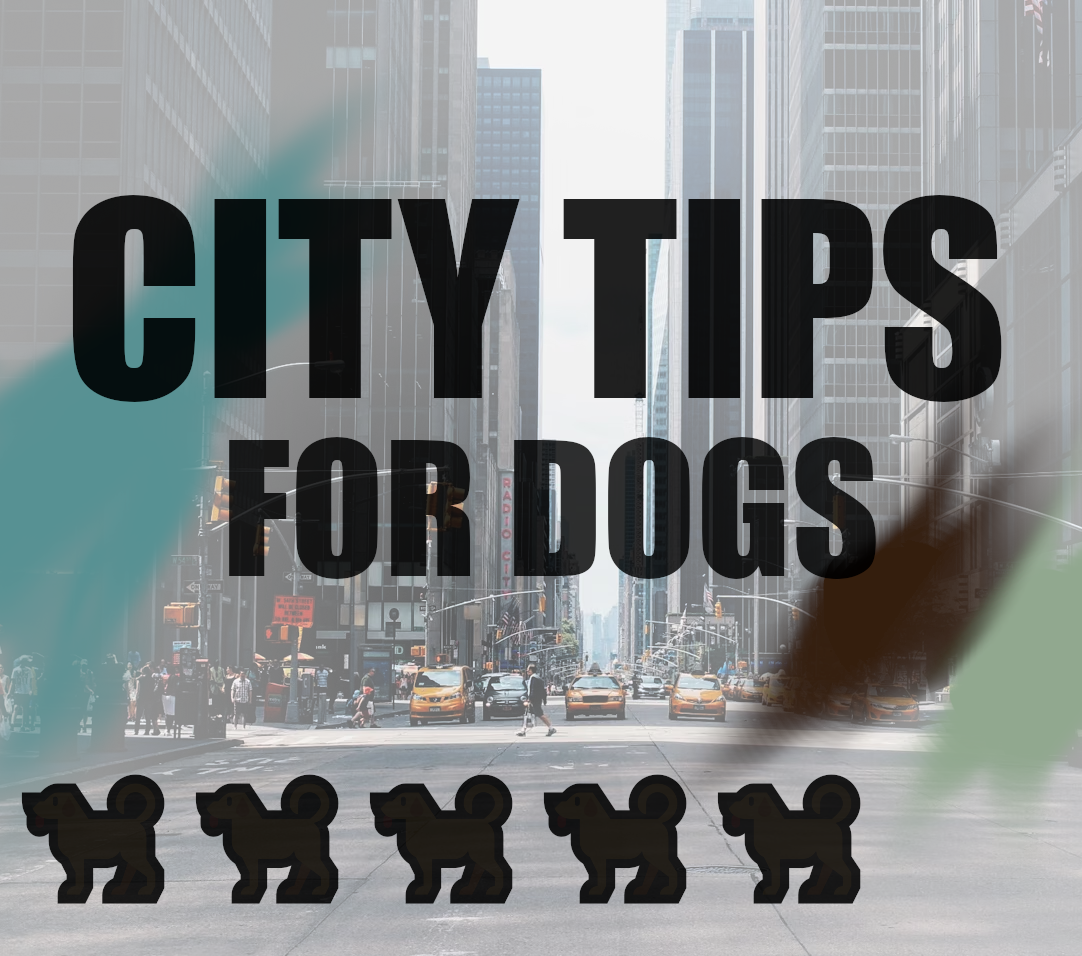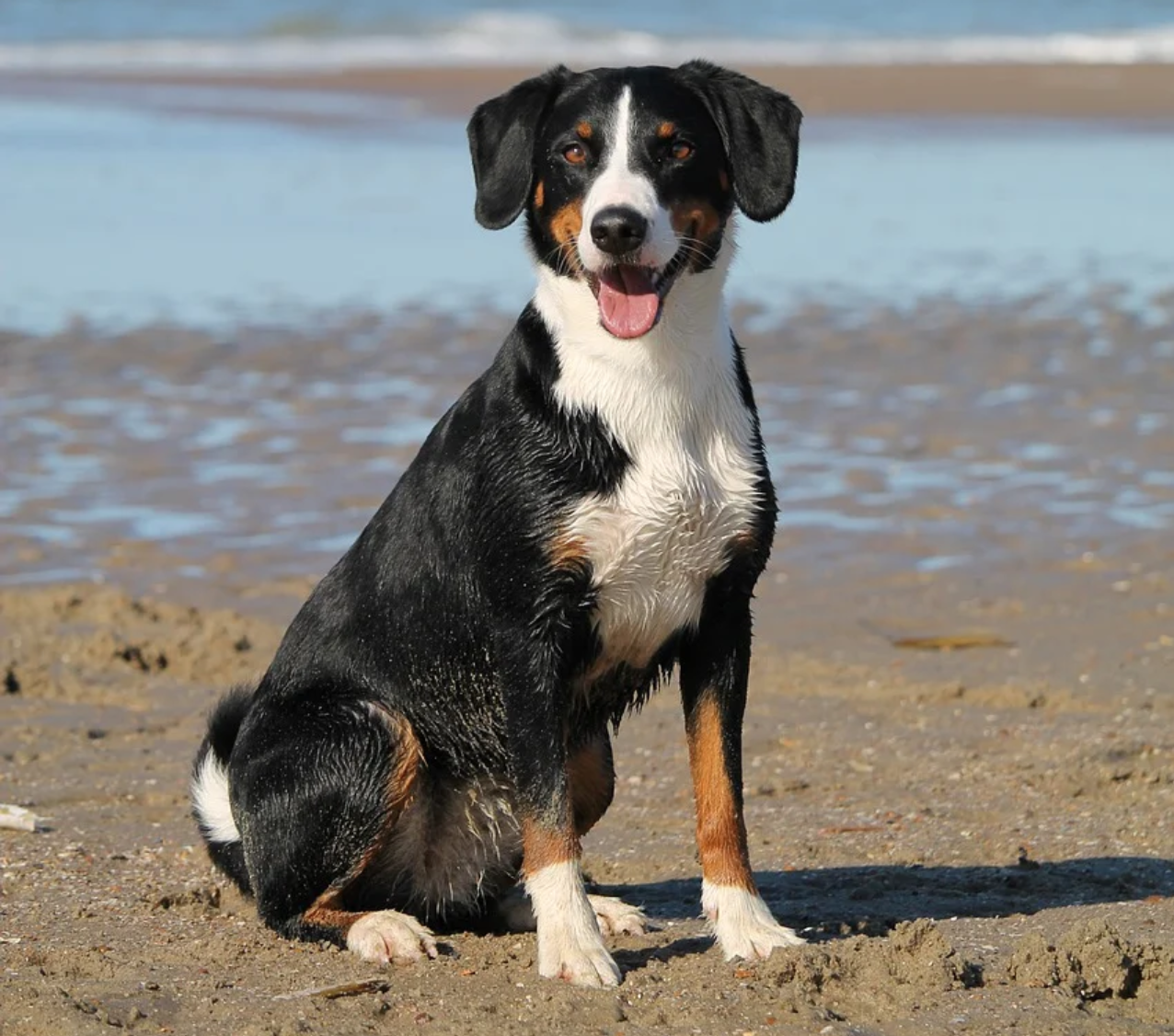City Tips for Dogs!

Every city in the entire world has three things: humans, animals, and hazards. As animal-loving humans, we want to use our human abilities to keep the animals as far away from the hazards as possible. And yet, there are hundreds of thousands of pets living with humans in major metropolitan areas all over the world. From New York to Shanghai, humans have created sprawling metal jungles of urban planning and towers that reach into the very heavens themselves. And, wherever humans go, so too do the animals that they happen to live with. Family, right?
But cities can be complicated to navigate even for street-smart humans, much less animals who tend to rely a lot more on immediate scents and sounds. Things that are much harder to interpret when there's a cacophany of them all around you. Like an impressionist painting, if there's too much going on it can be hard to tell what's going on at all. So here's a few tips for those of you either looking for animals while living in the city, or for people who are moving to the city with animals in tow!
It's important to understand that there are some key differences in the way that living works in the city. Unless you happen to be very rich, chances are you're going to be living in some kind of condo. Think of it like owning a house on a cul-de-sac, but, what you own is an apartment with a few rooms, and there's a really tight homeowners association. Condos tend to have rules that everyone in the building needs to abide by. And, related to zoophilia, most buildings have restrictions on the kinds of pets that people are allowed to have. For some buildings, they may not allow pets at all. Violation of these rules can get you in a lot of trouble, from large fines you might have to pay, to getting your home forcefully sold depending on the rules where you're living. Most buildings don't have full bans, but instead have restrictions. This might be on the number of animals, the kinds of animals, or the size. It's a lot to get into, and every building has different ways of measuring. Some go by height, some weight, some by breed. Some buildings allow different animals than others. So, before getting a pet or bringing a pet into a new space, make sure you take a look at the rules surrounding what pets are allowed.
Speaking of size, there's something else that's really important to remember, when it comes to adding non-humans into your living space. If you're from the city already you probably know this, but living spaces in densely populated areas tend to be a lot smaller. It's not uncommon to see apartments that are 500 square feet. Sometimes even less for studio apartments. Essentially, just one single room. This might severely impact the kind of animal that you want to get. Some dogs need lots of room to run about and play, and if you have a TV and a laptop and a bunch of other breakable things, a high energy dog just looking to run around is going to put those possessions in jeopardy if they aren't taken outside frequently to burn that energy off. Similarly, a large dog might make you feel even more cramped in your already-cramped apartment. And for cat zoos? Cats tend to like a place where they can hide whenever they're feeling stressed or if there are strangers over. It's not impossible to give them some space even in a small apartment, but be aware of the fact that you'll have to sacrifice some of your very limited square footage to keeping a safe space for your feline friend.
If you're really on a budget and looking for the best animals to have with you in a very small space, consider an even smaller tank animal, such as rats, ferrets, or hamsters! I know those don't tend to be the animals that zoos are most excited about, but all of those animals can be really great friends or companions, and the small size of the apartment can actually be a good thing since it means that you can let them out to play more often without having to search the whole house for them afterwards. If you really do want to get a dog, a small breed that likes to lounge is probably your best bet. Corgis for instance are very cute, but aren't going to be bouncing off the walls.
You will, of course, still have to take your dogs out on walks, and walking in the city can be a little bit more complicated than in more rural areas. First of all, there's just a lot more going on. There's going to be a lot of traffic and people and sights and smells and things. Some dogs seem to like this, and handle it very well. Others can easily get overwhelmed. It's important to take note of how your dog is feeling. If they don't do very well on busy streets, consider creating some kind of route that takes you through alleyways and onto side streets where the noise might not be so bad. You also need to be much more careful for the squirrel effect. Sometimes a dog will see a squirrel and rush after them, catching unsuspecting dog walkers by surprise. In the city, that potential is everywhere. Maybe there's a hot dog stand down the road, maybe there's another dog just out of view. Maybe there's another city living animal hiding in the bushes that your dog wants to go say hi to. Interesting things are everywhere, but so is potential danger. It's going to be your job to learn the signs of when your dog might be looking to hone in on some interesting smell, and to stop them from trotting straight into the road.
There are also lots of things that you probably do not want your dog sniffing in the city. Depending on the area that you're in, people are much more likely to just toss food, drinks, or other substances wherever they happen to be when they're done with them. If you're in a city that doesn't do a good job of cleaning up, pay attention to wherever your dog is sniffing. There might be leftovers that are really bad for them, due to ingredients, diseases from other animals, or just because it's a chicken nugget that's been sitting on the curbside for a week in the middle of the summer. This is doubly true during the spring if you live somewhere with snow. Things that have been discarded during the winter months can end up forgotten and then only resurface when that snow melts. Trust me, it is gross, and definitely not something you want your dog sticking their nose into, especially if they're going to want to ask to kiss you later.
You may also want to be careful where your dog walks as well. When you can't see the ground, that's usually a red flag. Whether that's because of snow, or even something like fallen leaves, you're better off not walking there. As someone who walks through a lot of alleyways I've seen discarded needles just on the street. You do not want your friend stepping on one of those. All said, you need to make sure that you're paying attention when you're walking around. You aren't there just as a guide, but also a protector, making sure that they're safe from all the dangers of this metropolis that they just don't understand.
Another thought for dogs is that you're going to want to make sure that they're well socialized. You are going to come across a lot of other dogs while walking around. Most of them will be friendly, so long as you and yours are friendly as well. This can be a great way to meet new people and make new friends, as your dog and theirs give each other a quick sniff. But if your four legger is aggressive towards strangers, this can be a really big problem for city living. The best way to socialize dogs is to do so early, and make sure they get the chance to meet lots of other dogs. If it's too late for that, the best thing you can do is make friends with another dog owner in the city and slowly introduce your dogs to one another.
Sometimes, once your dog makes one friend, they're more trusting of other strangers as well. This is extra important because of dog parks. I was just talking about how much walking around the streets can be stressful. Dog parks are where you can let loose and have fun. They tend to be large (for the city anyway) enclosed areas with grass and maybe even some trees. I try to take my dog to a park at least twice a week for an hour or so. Dog parks are almost always occupied by people who want to give their pets some room to run around. I would consider dog park visits an essential thing for anyone with a dog in the city, so their life isn't just small apartment and short leash.
However, with lots of dogs comes lots of potential for conflict. It's the same as if you brought twenty random humans together. Sometimes dogs don't get along. And if that's the case, it's important that dogs know how to avoid each other rather than get into fights. Typically it's pretty easy for dogs to get along with one another, but if your dog hasn't been around many others at once, they might feel overwhelmed. If you can tell that it's stressing your canine out, consider making an effort to going at off hours where there might be less dogs around at first to give them time to acclimate to the space and with a little less pressure, before introducing them to larger groups. Also, please be aware that some dog parks have restrictions based on different dog sizes. Small dogs and massive dogs playing is much more likely to end in injury after all. Make sure you consult the rules, usually posted on a sign nearby, to make sure that both your four legger and everyone else's are safe.
There's one more thing to think about when it comes to the city and that's getting around it. It's pretty common to not drive when you're getting around, opting instead to walk, or take transit, whether that's busses, streetcars, or subways. Different cities might have different venues of transit on offer. Different cities also have different rules when it comes to pets on transit. For some, they allow pets on off-peak hours. Others on weekends. Some allow them on the subway but not busses, or only on streetcars. Knowing what those rules are is important, as it lets you know what your options are as far as urban exploration. Different parts of the city are home to different things, and if you want to bring your dog on that journey transit is the best way to do it.
It's important to note here that certain forms of transit are going to be more or less scary for dogs. Busses can be really packed, the subway can be loud and enclosed. The first time you ever try going on transit with your dog, make sure you pay attention to them and see how they feel about being in a loud fast moving tube.
And, it's important to remember that every dog is unique. Breeds are not a one-to-one descriptor of exactly who a dog is. Likewise, different dogs are going to do better or worse in the city. Some dogs are metropolitan socialites with the best of any urban dweller. Friends with every dog in the neighborhood, choosing to not eat any weird stuff on the ground, never suddenly darting off, and generally being chill when at home. Other dogs just aren't meant for the city. The cacophony is too much for them, they're anxious and get aggressive, they need more space to be able to be happy. And at that point you're faced with a really tough choice.
So here's my recommendation. If you're someone interested in moving to the city and you already have an amazing dog, find a friend and either stay with them for a couple of days, or have them dog sit for a couple of days. See how your dog reacts to that environment. It's still going to be a big, weird change for them, but if they seem excited about it that's a good sign. If they seem to not want to go outside and are anxious every time you go yourself, maybe the city isn't for them. If you're getting a new dog and you already live in the city, take some time to learn about their background. If they're a puppy, that's probably the easiest time to introduce them to a new environment. If they're a little older and you're adopting them, see where they came from. If they lived in the city previously they might be fine. If they're from somewhere quieter, it might be best to get them for a week and see how they do.
And if you don't want to deal with any of this, think about getting a different kind of animal! There are all sorts of awesome critters out there!
Living in the city can be awesome. Pawsome. There's so many people you get to meet, there's always stuff to do, it can be a really fantastic place to live. But, cities are the epitome of human designed society. Cities can be hostile to humans, and even more-so to animals. It's important to make sure if you're going to bring an animal into that environment that you know what you're doing, and you're making sure to make the right choices to ensure both of you are happy.
Article written by DogZilla (January 2025)
Questions, comments or concerns? Check out our Discord server! discord.gg/EfVTPh45RE




